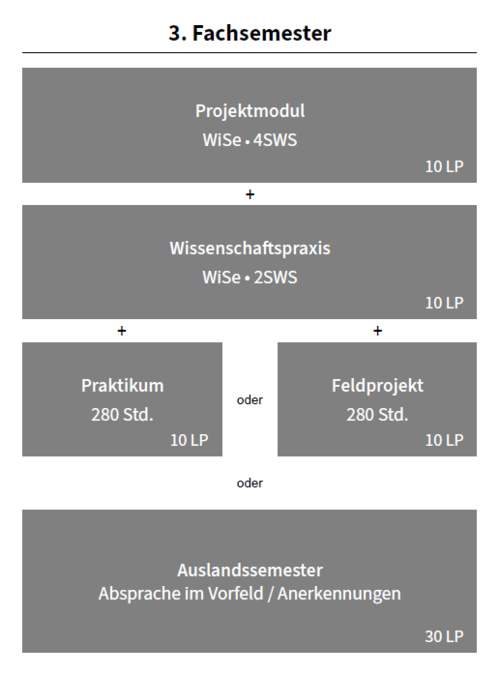Project module (10 LP)
Scheme of the 3rd semester of the Master's program in Interdisciplinary Latin American Studies (SPO 2023)
Students familiarize themselves with a selection of current debates relevant to Latin American studies, which they approach under guidance and supervision and on which they complete a complex task over a defined period of time. They learn to work on an academic, practice-oriented project in a thematic field. This prepares them for the final phase of the master’s program by bridging their studies with professionally relevant topics in and outside of academia.
Students are given a brief introduction to project work/project management that serves all project modules. During the semester, they learn about various project phases, including conception, implementation, and follow-up work. Students learn to plan, execute, present, and reflect on a project within their profile, both independently and in groups. On the one hand, they acquire practical disciplinary and interdisciplinary research, organizational, and media skills. On the other, they learn to take responsibility within the framework of projects, to lead and coordinate, to support fellow students, to conduct cross-disciplinary discussions, and to present their results in different media formats. They learn to understand the application and practical professional relevance of their findings, to communicate their findings, and to discuss the impact of their academic work on society, the economy, and culture. In addition, thanks to joint project work, they gain a high level of competence in relation to interculturality, gender, and diversity. They can also work independently and in groups in different contexts and reflect on their activities and positionality.
ContentThis compactly structured module, which draws on various forms of synchronous and asynchronous collaboration, allows students to process, accompany, coordinate, and publicly present a project that focuses on the reappraisal and reception of research debates in and on Latin America. The practice-oriented projects are based on students’ study profiles and are offered on both current and academically relevant topics. Possible projects include a joint publication in print and/or an online format, a podcast, a conference, an exhibition, a lecture, a film or performance series, an excursion, or a cooperative event. The projects are developed over the course of a semester, where students develop and discuss cross-disciplinary project questions, with special attention to the principles of good academic practice, ethics, and social responsibility.
In this interdisciplinary forum, which prepares students for the final phase of their master’s program, students explore various research approaches and fields of application in depth according to their profile area. Throughout the project, students focus on discussing and applying different methods within their study profiles, which are geared to the cultural sciences/humanities, social sciences, regional studies, or gender relations; they also carry out joint and individual sub-projects. Project modules may be offered in block format, whereby the main project phase takes place in January/February, predominately in person.
EssentialsTeaching and learning methods: Projektseminar (PS)
Module exam: Projektarbeit (approx. 10 pages)
Offer: every winter semester
